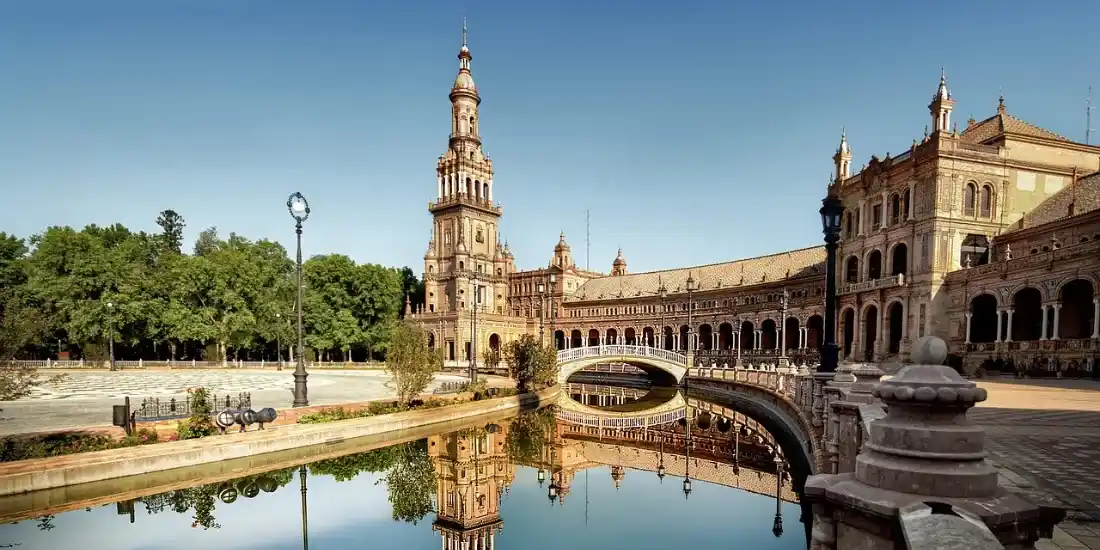
About the City – Life as a Student in Seville
If you’ve ever pictured yourself sipping café con leche under orange trees with a textbook in one hand and flamenco music in the background, stop dreaming. That’s your daily reality when you study in Seville.
Located in southern Spain, Seville (or Sevilla, as the locals say) is the fiery heart of Andalusia. It’s where Spanish culture lives loud, bright festivals, long siestas, warm evenings, and even warmer people. This city has a heartbeat. And it dances to its own rhythm.
But it’s not just about style, it’s smart, too. Seville is a major university city, and its academic landscape is as rich as its tapas culture. With a low cost of living, a high quality of life, and thousands of students from around the globe, it’s one of Europe’s underrated gems for international education.
So whether you’re chasing a degree, a semester abroad, or just unforgettable memories, studying in Seville offers more than a classroom ever could.
Why Seville Is Perfect for International Students
1. Top-Tier Academic Institutions
Seville is home to some of Spain’s most respected universities like the University of Seville, Pablo de Olavide University, and a number of international study centers. From international business to architecture and biotechnology, there’s a strong academic offering supported by expert faculty.
Many universities offer fully English-taught programs, especially at postgraduate level, and actively participate in the Erasmus+ program, making it easy for students to transfer credits and feel at home.
2. It’s Affordable (And Fun!)
Let’s talk numbers. Compared to Madrid or Barcelona, Seville is 25–30% cheaper. That means you can dine out for under €10, rent a stylish shared flat for €300–€500, and enjoy student life without budget stress.
3. Warm Weather, Warmer Culture
This city gets over 300 sunny days a year. Combine that with friendly locals and a buzzing student population, and you’ve got the recipe for an amazing experience. It’s also incredibly walkable and safe.
4. Student Vibe Like No Other
With over 70,000 university students, Seville thrives on youthful energy. Concerts, theatre festivals, language exchanges, and open-air cinemas are just a weekly part of student life.
Bottom line? To study in Seville is to combine world-class education with real cultural immersion.
Top 10 Universities and Colleges in Seville
1. University of Seville (Universidad de Sevilla – US)
One of Spain’s oldest and most prestigious public universities. Offers programs in law, economics, health science, arts, architecture, and engineering. Many courses offered in English and widely popular with Erasmus students.
2. Pablo de Olavide University (UPO)
A modern, innovative public university with strong international programs. Particularly known for social sciences, business, biotechnology, and sports science. Offers semester-long and full-degree courses in English.
3. Loyola University Andalusia
A private Jesuit university with a large campus in nearby Dos Hermanas. Bilingual programs in business, engineering, and psychology. Highly global, with exchange partners worldwide.
4. International College of Seville (ICS)
An educational hub hosting American and European university students for semester abroad programs. Includes cultural immersion, language classes, and internships.
5. CEA Study Abroad – Seville Center
Partnered with international institutions across the U.S. and Europe. Offers flexible study abroad programs in humanities, marketing, and Spanish studies.
6. EUSA University Centre
Specialist in communications, business, tourism, and education. Officially affiliated with University of Seville.
7. Menéndez Pelayo International University (UIMP)
Offers high-level summer, language, and postgraduate programs centered on Spain’s culture and academic heritage.
8. Sevilla School of Art (Escuela de Arte de Sevilla)
Top-tier design, visual arts, and fashion programs. Great for creatives pursuing hands-on study in a European art capital.
9. Clic International House Seville
Language school ranked among the best in Europe for Spanish immersion, especially helpful for short-term and Erasmus+ students.
10. Instituto Hispánico de Sevilla
Another top Spanish language school, offering semester and short intensive programs with rich cultural immersion.
Top 10 Student Accommodation Properties in Seville
- Livensa Living Sevilla
- Yugo – Cartuja Student Residence
- Micampus San Bernardo
- Residencia Universitaria Rector Estanislao del Campo
- El Parque Student Residence
- The Student Hotel Sevilla
- Residencia Universitaria R.U. Los Remedios
- Residencia Universitaria Paz y Bien
- Vita Student Sevilla
- Aluni Student Flats – Sevilla Central
These modern properties offer furnished rooms, study spaces, laundry, Wi-Fi, and often perks like gyms, cafés, or rooftop terraces.
Top 10 Student Areas in Seville (With Nearby Universities & Housing)
1. El Centro (Old Town)
- Nearby: University of Seville central faculties
- Accommodation: Vita Student, flatshares
Historic, lively, and buzzing with energy. But rooms can be pricey and noisy on weekends.
2. Los Remedios
- Nearby: EUSA, central faculties
- Accommodation: R.U. Los Remedios
Residential and tidy, with riverside walks and tapas joints on every block.
3. Nervión
- Nearby: Loyola University (short ride), stadium area
- Accommodation: Student Hotel Sevilla
Trendy and well-connected. Bonus: it has one of the city’s largest malls.
4. Reina Mercedes
- Nearby: Engineering, Sciences, Health at University of Seville
- Accommodation: Residencia Estanislao, easy flat rentals
A go-to zone for science students. Affordable and student-heavy.
5. Triana
- Nearby: Close to UPO shuttle stops, city centre
- Accommodation: Private studios, shared flats
Flamenco heartland. A riverside boho vibe with hidden cafés and lots of culture.
6. La Macarena
- Nearby: Medical campus, nursing and health science
- Accommodation: Micampus Macarena, student hostels
Cultural, eclectic, and fun. Famous for its local flavor and budget-friendly eats.
7. Cartuja
- Nearby: Engineering & sports sciences at UPO
- Accommodation: Yugo Cartuja, private studios
Known for its modernity and campus feel. Close to parks and Seville’s tech park.
8. Heliópolis
- Nearby: Pablo de Olavide University (by shuttle)
- Accommodation: Shared houses, economy flats
Peaceful, green and cheap. Mostly students and young professionals.
9. Dos Hermanas
- Nearby: Loyola University
- Accommodation: University-managed apartments
Technically outside Seville, but a 15-minute train puts you in the city fast.
10. San Bernardo
- Nearby: EUSA, Law and Humanities Faculties
- Accommodation: Micampus San Bernardo, Aluni properties
Strategic, walkable, and popular among Erasmus students.
Cost of Living in Seville – What Students Can Expect to Spend
Let’s break it down. Seville is not just budget-friendly, it’s downright student-centric.
| Category | Average Monthly Cost (€) |
|---|---|
| Rent (shared/studio) | €300 – €600 |
| Groceries & Eating Out | €150 – €250 |
| Utilities & Internet | €50 – €80 |
| Public Transport | €35 (bonobus student card) |
| Leisure & Extras | €80 – €150 |
➡️ Total Monthly Budget: €700 – €1,100
Tips for saving:
- Eat where locals go (menu del día = budget gold).
- Tapas are often free with drinks.
- Apply for ERASMUS grants, regional scholarships, or tuition discounts where available.
- Share flats instead of going solo.
All in all, it’s possible to live comfortably in Seville for less than in most Spanish or EU cities, making it a standout choice for smart students.
Local Transport in Seville – Move Around Like a Local
Seville is built with students in mind, easy to navigate, affordable, and eco-forward.
1. Metro de Sevilla
Only one line (so far), but it connects key student zones. Perfect for Nervión and UPO commuters.
2. Bus Network (TUSSAM)
Biggest lifesaver. Over 40 lines cover the entire city, including night buses. Bonobus card gives you discounted rides.
3. Sevici (Bike Sharing)
€33/year student plan. Best for central areas. City is flat and bike stations are everywhere.
4. Walking
The city is very walkable. Between shaded boulevards and medieval alleyways, walking becomes a joy.
5. Cercanías (Local Trains)
Essential for day-trips or if you’re studying at Loyola’s Dos Hermanas campus.
Summary – Let’s Recap Why You Should Study in Seville
If you’re craving a study abroad experience that’s a little bit different, but a whole lot unforgettable, study in Seville. This is where academic ambition meets cultural immersion. Where every street sings with life, every night is a party, and every lesson goes beyond the classroom.
You get best-in-class education, real Spanish culture, budget-friendly living, and a tan that lasts all year. Add sangria-fueled debates, history class inside palaces, and weekend flights to Portugal or Morocco, and you’re onto something special.
Seville isn’t just a city. It’s a feeling. And it leaves a mark long after you’ve packed your bags.
Top 10 FAQs About Studying in Seville
1. Is Seville a good city for international students?
Yes! It’s affordable, safe, student-friendly, and packed with cultural and academic value.
2. Can I study in English in Seville?
Absolutely. Several universities offer full programs in English, especially at postgraduate level.
3. How much does it cost to live in Seville as a student?
Expect to spend €700–€1,100/month, including rent, food, transport, and entertainment.
4. Are there scholarships for international students?
Yes. ERASMUS programs, UPO grants, and public university discounts are available.
5. Is Seville safe for students?
Very. It ranks as one of Spain’s safest cities, especially in student neighborhoods.
6. How can I find housing?
Through platforms like Aluni, Livensa, Yugo, or university housing offices.
7. Do I need to speak Spanish?
Not necessarily. English-taught programs exist, but knowing Spanish boosts your experience.
8. What’s the weather like year-round?
Hot summers, mild winters, and 300+ days of sunshine annually.
9. Is part-time work allowed for international students?
Yes, with a valid visa. You can work up to 20 hours per week.
10. Why choose to study in Seville over Madrid or Barcelona?
Lower costs, deeper cultural immersion, stronger Erasmus community, and way better weather.






